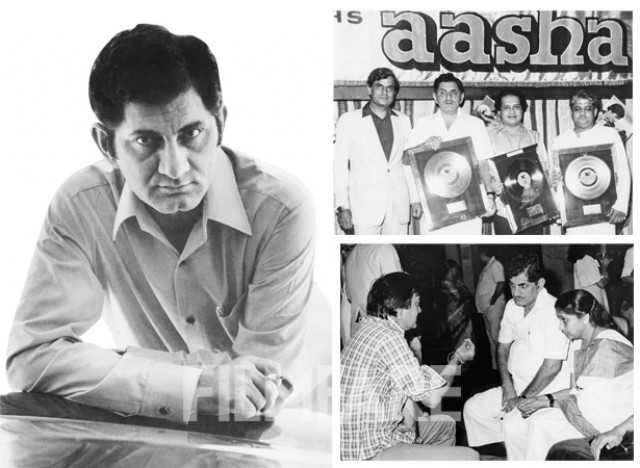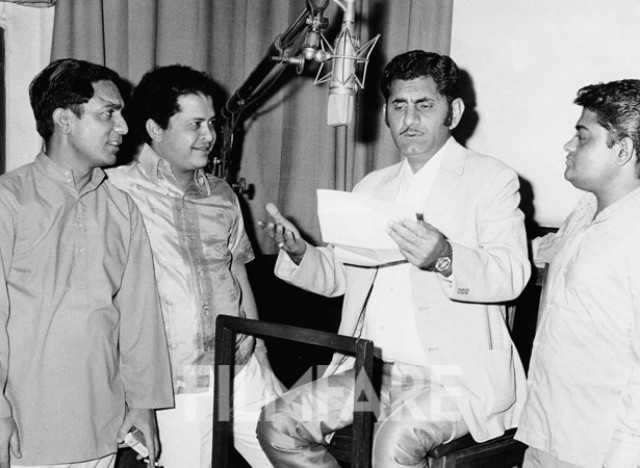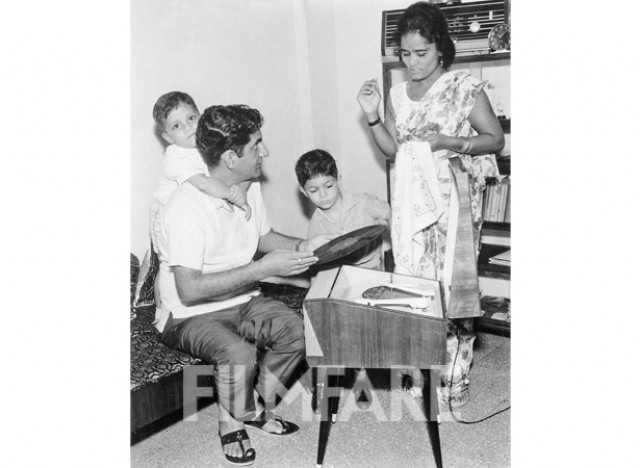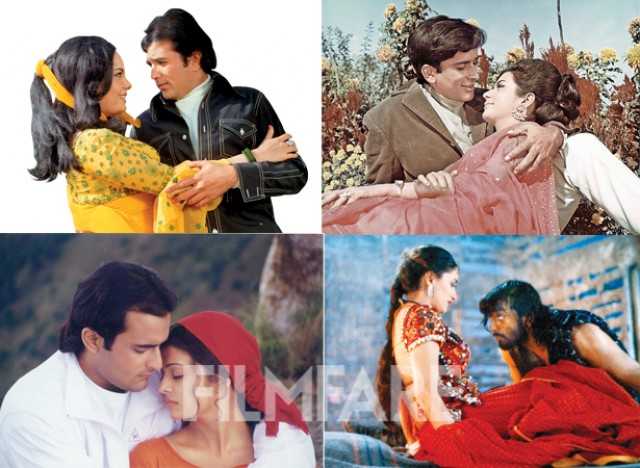Anand Bakshi (July 21, 1920 - March 30, 2002) and Rakesh Anand Bakshi
Anand Bakshi was a juggler of words – drawing out songs from the endless spring of his heart. He had a song for every reason, every season... Over 3500 songs in over five decades, he was the most vibrant lyricist that the industry has witnessed. He wrote Zindagi ke safar mein guzar jaate hain when he was 40, Mehendi laga ke rakhna when he was 65 and Zinda rehti hain mohabbatein at 70, such was the lushness of his mind. From Shamshad Begum, who sang his Patli kamar nazuk umar for Lootera in 1965 to Shreya Ghoshal who reprised his Bade acche lagte hain from Ballika Badhu for the eponymously titled TV serial in 2015... Bakshi’s songs have outlived the actors, the films and the audiences they were created for. But the lyricist himself was never taken in by his abundance. “Yeh sab barsaati makan hai pata nahin kab gir jaayenge (these are temporary sheds).
I overtook some people, some people will overtake me,” he’d say self-depreciatingly. Strangely, his vulnerability and versatility both came from the traumas that the ex-army man could never overcome. Plagued by a sense of abandonment, the angst became the reference point of his life and art. The loss of his mother when he was 10, the loss of his motherland Rawalpindi (Pakistan) when he was 17 and the loss of his ‘brave’ identity when he quit his army job... all contributed in making Bakshi both phobic as a person and prolific as a writer. As Rumi rightly said, “The wound is the place where the light enters you.” Here, Bakshi’s son and author Rakesh Bakshi (he’s just released his Directors’ Diaries – The Road to their First Film) tells you why Anand Bakshi remains the people’s poet...

With Laxmikant-Pyarelal on the silver jubilee of Aasha (on top) and With Sunil Dutt and Asha Bhosle (on bottom)
Childhood chaos
Dad’s childhood was spent in pre-Independence Rawalpindi. He was brought up in a regimented atmosphere, his grandfather, being the Superintendent of Police, Punjab Prisons. His father was in the army. As a child, when his grandfather caught dad acting or singing he was beaten up. His grandfather considered singers/actors as ‘kanjar’ or people of ill-repute. Dad lost his mother Sumitra Bali when he was around 10. She was 25. She died during the birth of her second child. That void remained in his life forever.
Dad joined the Royal Indian Navy in the ’40s after he failed in school. He did so in the hope that when the ship would harbour at Mumbai, he’d jump off and pursue his dreams of being a singer/actor. But as luck would have it, his ship remained anchored at Karachi.
The Partition happened when he was 17. The family had to leave Rawalpindi overnight. They fled in a Dakota Plane. When they reached Lucknow, his grandfather asked him what he had managed to bring from Rawalpindi. Dad said that he had just picked up his mother’s photographs. His father was angry that he had left the valuables behind. “Money, we will someday earn. From where will I get these pictures?” asked dad. Such a sentimental person had to become the legendary Anand Bakshi...
Anyway, dad took up a job in the refugee quota in the Indian Army (Corps of Signals). Later, he married my mother Kamla Mohan in 1954. Dad’s aunt had suggested my mother to him in a letter describing her as, “She’s plump, she knows sewing and can ride a bicycle. But she’s dusky!”
Afterwards, dad quit his job with the army to try his luck in the film industry. When he came to Mumbai, dad first visited the Haji Ali Dargah! My mother stayed on in Lucknow and supported herself and her first born, my sister, Suman, by sewing clothes. Dad was heartbroken when he once visited them only to have his daughter look at him and ask, “Who is this man?’’ Heeding to the late producer Surinder Kapoor’s advice, he then brought mom and Suman to Mumbai.

Recording a song with Laxmikant-Pyarelal
Making music
During the early days he was once caught for travelling in a train without a ticket. The ticket collector, Chitramal Swaroop, a kind-hearted man seeing the young man’s potential, took dad to his home in Borivali and gave him shelter for a few years. Dad’s first break was in Bhagwan Dada’s film Bhala Aadmi (1958). But his first success came with Mehendi Lagi Mere Haath (1962), produced by Hiren Kheda, Raj Kapoor’s secretary. This was followed by hits like Himalay Ki Godh Mein (1965), Jab Jab Phool Khile (1965) and Milan (1967). He found great popularity with films like Amar Prem, Sholay, Amar Akbar Anthony, Ek Duuje Ke Liye and many more through the ’70s. He went on to work with renowned directors like Raj Kapoor, Subhash Ghai and Yash Chopra and wrote the lyrics for Bobby, Taal, Yaadein and Dil Toh Paagal Hai among others. Mention must be made about Dilwale Dulhania Le Jayenge (DDLJ, 1995)... which broke all records. Over 3500 songs in over 600 films... dad’s was a four-decade long career.
The person
My sister Suman witnessed the tough times my parents went through. But I was born when he was at the top. One memory of him I cherish is when he’d come home late and walk into the room where we children (sisters Suman and Kavita, older brother Rajesh and me) would be sleeping. He’d sit near me and gently caress my head. The minute I’d turn, he’d move away. He found it difficult to express his love. So, I’d pretend to be asleep so that he would sit near me longer. Once I happened to leave an egg unfinished. He said, “Do you know the price of this egg? When we couldn’t afford eggs, your mother would divide an egg into four parts and distribute it between you four children. She wouldn’t eat it. That’s the value of an egg.”
Dad looked up to Bismil Saeedi, editor of the Urdu magazine Biswin Sadi. Bismil saab would often tell dad, “You don’t know Persian but your phrases have the language’s lilt.” Sahir Ludhianvi taught dad how to weave poetry into lyrics. He even introduced him to producers. Once he even asked Yashji (Chopra) to try dad as a lyricist. But dad wrote for Yashji’s Chandni (1989) only after Sahir saab passed away. Dad enjoyed Mirza Ghalib’s poetry as much as listening to folk songs. Another passion was cars. He changed his cars every two years. His first car was a 1964 Fiat model. He’d change his house every few years too. He enjoyed food....paya, black daal… and he loved his whisky. At 9 pm sharp he’d open his bottle. You could call him a hard drinker but he was not an alcoholic. He never picked up his pen when he drank. The pen was Goddess Saraswati. Otherwise he’d note down his thoughts on whatever paper was available – sometimes even on his 555 cigarette pack.

Anand Bakshi with wife Kamla and sons Rajesh and Rakesh
WRITER’S BLOC
He did feel unsure of himself in comparison with his peers (Majrooh Sultanpuri, Kaifi Azmi) because they were all poets. “A poet writes from his own imagination. I write inspired by the story, characters and situations,” he’d explain. “The song just enters my mind... I don’t write it. This tukbandi (random rhyming) will not last long,” he’d say.
He’d sing out the songs for the singers. I remember him sing Mere naina sawan bhadon (Mehbooba, 1976), Dafliwale (Sargam, 1979) Jab hum jawan honge (Betaab, 1983)... He’d say, “Being a singer, tune and words take birth together in me.” When writing for Rajesh Khanna, he’d ‘hear’ the song in Kishore Kumar’s voice.
Once I happened to joke, “You write such beautiful songs for Raj Kapoor, Yash Chopra, Shakti Samanta, Raj Khosla, Subhash Ghai… for others you give dabba lyrics and you even take money for them!” He got upset and said, “They inspire me, others don’t.
I am a mirror. I reflect what’s given to me.” He didn’t like when filmmakers, who knew nothing about lyrics, tried to dictate things to him. Once during a music sitting, a top director remarked, “Mazaa nahin aa raha hai Bakshi saab... Why don’t you write something like Yahan main ajnabi hoon (Jab Jab Phool Khile)?” Dad shot back, “Give me such a story and I’ll write such a song. Now, you can take your money and get out!” When Tanuja Chandra came to him saying she loved his work but her budget for Dushman (1998) couldn’t match his price, he retorted, “Who are you to determine my price? First inspire me!” He heard the story and the next day Chitthi na koi sandhesh was born.

(clockwise) Stills from Aap Ki Kasam, Amar Prem, Khal-Nayak and Taal
FEAR OF BAD TIMES
No matter how successful he was, the fear of bad times never left dad. Once, he was depressed. “Kaka (Rajesh Khanna) ka phone tha. He said, ‘I’m going through such bad times ke mujhe koi kutte ka bhi phone nahin aata!” he shared. That’s why dad wanted to go as No.1. Dad considered the love he received from his fans as his actual rewards. He went on to share the contents of a letter a fan had written to him. This person, severely depressed, had contemplated suicide and put his head on the railway tracks. But from a distance he heard the lines Gaadi ka naam na kar badnam patri pe rakh ke sar ko… (from Dost, 1974) playing on the radio. He felt a change of heart and returned home. “These awards I will leave behind for you to decorate the house. But this sense of satisfaction, I will carry along,” he remarked.
Pain and Pen
The song Zindagi ke safar mein (Aap Ki Kasam, 1974) was inspired from dad’s own life and the tragedies that haunted him. The first loss was that of his mother when he was 10. He could never overcome this feeling of abandonment. The second loss was that of his motherland Rawalpindi during the Partition. The third loss was that of his identity. In the army he was called Anand Prakash Bakshi. In films he became Anand Bakshi. He’d often lament the fact that he had earned fame and name but he had lost the confidence of the fearless army man.
Through time he developed phobias. He was a hypochondriac – he obsessed over imaginary illnesses. His doctor accompanied him everywhere. The fear of getting into a lift, the fear of air travel, the fear of heights... began to control his life. He would not visit a producer whose office/home was more than two storeys high. One top producer from the South, asked dad to fly down. Dad refused. The producer later came to Mumbai. He was booked on the 14th floor of The Taj. Dad again refused to meet him. Finally, the producer came home. Also, he had this phobia of being left alone. Someone had to be around him all the time. Dad consulted a psychologist to overcome this disorder. The doctor advised that if he wanted to become Anand Prakash Bakshi, he’d have to go back to doing the things he did earlier. One was travelling in trains. So the driver would drop dad at Khar station. He’d travel to Churchgate, stroll around Marine Drive where he spent his struggling days, or visit Bhagwan Dada’s office in Dadar, where he had got his first break. Then he’d travel back.
But one sorrow that dad could never get over was the passing away of his mother. That’s why he could write the most beautiful songs on a mother – Tu kitni acchi hai (Raja Aur Rank, 1968), Maa mujhe apne aanchal (Chhota Bhai, 1966) and O maa tujhe saalam (Khalnayak, 1993)...
LAST DAYS
Dad was a heavy smoker. He’d hold the cigarette and blow puffs like the way sadhus smoked chillam. That’s why he could write Dum maaro dum (Hare Rama Hare Krishna, 1971). But through the years, his lungs gave away. He slipped into coma twice. As he lay still, we’d make him hear his own songs via the earphones. The second time he fell unconscious, the doctor said that the part of the brain, which tells you who you are, is dead. That day, for the first time, I prayed for his death. That very day, dad passed away (March 30, 2002). He was 81. What was reassuring was the feeling that he had lived life on his terms. After his passing away, lyricist Sameer revealed to me, “Bakshi saab once told me, ‘I’m not sad that I won’t live long. What I lament is the fact that a thousand songs that lie within me will also go with me. Could I hand them over to you, I would have. But these songs have come with me and they will go with me.”